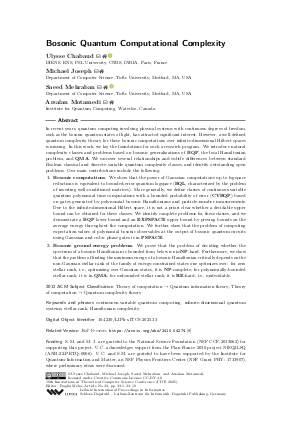LIPIcs.ITCS.2025.33.pdf
- Filesize: 0.85 MB
- 19 pages

 Creative Commons Attribution 4.0 International license
Creative Commons Attribution 4.0 International license

In recent years, quantum computing involving physical systems with continuous degrees of freedom, such as the bosonic quantum states of light, has attracted significant interest. However, a well-defined quantum complexity theory for these bosonic computations over infinite-dimensional Hilbert spaces is missing. In this work, we lay the foundations for such a research program. We introduce natural complexity classes and problems based on bosonic generalizations of BQP, the local Hamiltonian problem, and QMA. We uncover several relationships and subtle differences between standard Boolean classical and discrete-variable quantum complexity classes, and identify outstanding open problems. Our main contributions include the following: 1) Bosonic computations. We show that the power of Gaussian computations up to logspace reductions is equivalent to bounded-error quantum logspace (BQL, characterized by the problem of inverting well-conditioned matrices). More generally, we define classes of continuous-variable quantum polynomial time computations with a bounded probability of error (CVBQP) based on gates generated by polynomial bosonic Hamiltonians and particle-number measurements. Due to the infinite-dimensional Hilbert space, it is not a priori clear whether a decidable upper bound can be obtained for these classes. We identify complete problems for these classes, and we demonstrate a BQP lower bound and an EXPSPACE upper bound by proving bounds on the average energy throughout the computation. We further show that the problem of computing expectation values of polynomial bosonic observables at the output of bosonic quantum circuits using Gaussian and cubic phase gates is in PSPACE. 2) Bosonic ground energy problems. We prove that the problem of deciding whether the spectrum of a bosonic Hamiltonian is bounded from below is co-NP-hard. Furthermore, we show that the problem of finding the minimum energy of a bosonic Hamiltonian critically depends on the non-Gaussian stellar rank of the family of energy-constrained states one optimizes over: for zero stellar rank, i.e., optimizing over Gaussian states, it is NP-complete; for polynomially-bounded stellar rank, it is in QMA; for unbounded stellar rank, it is RE-hard, i.e., undecidable.
Feedback for Dagstuhl Publishing